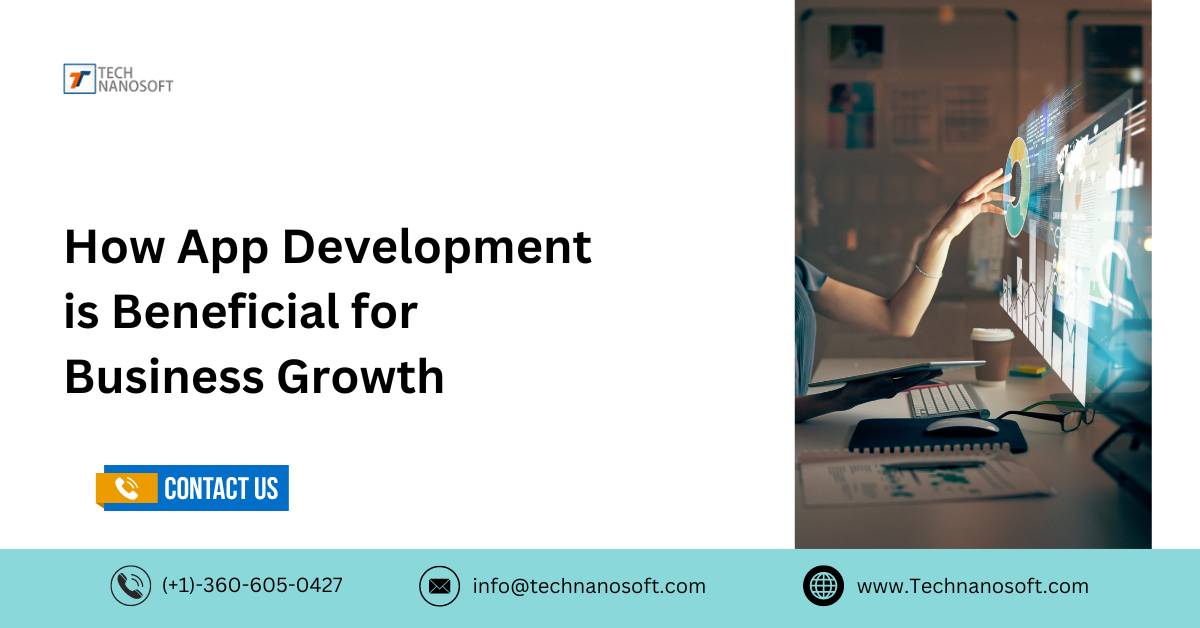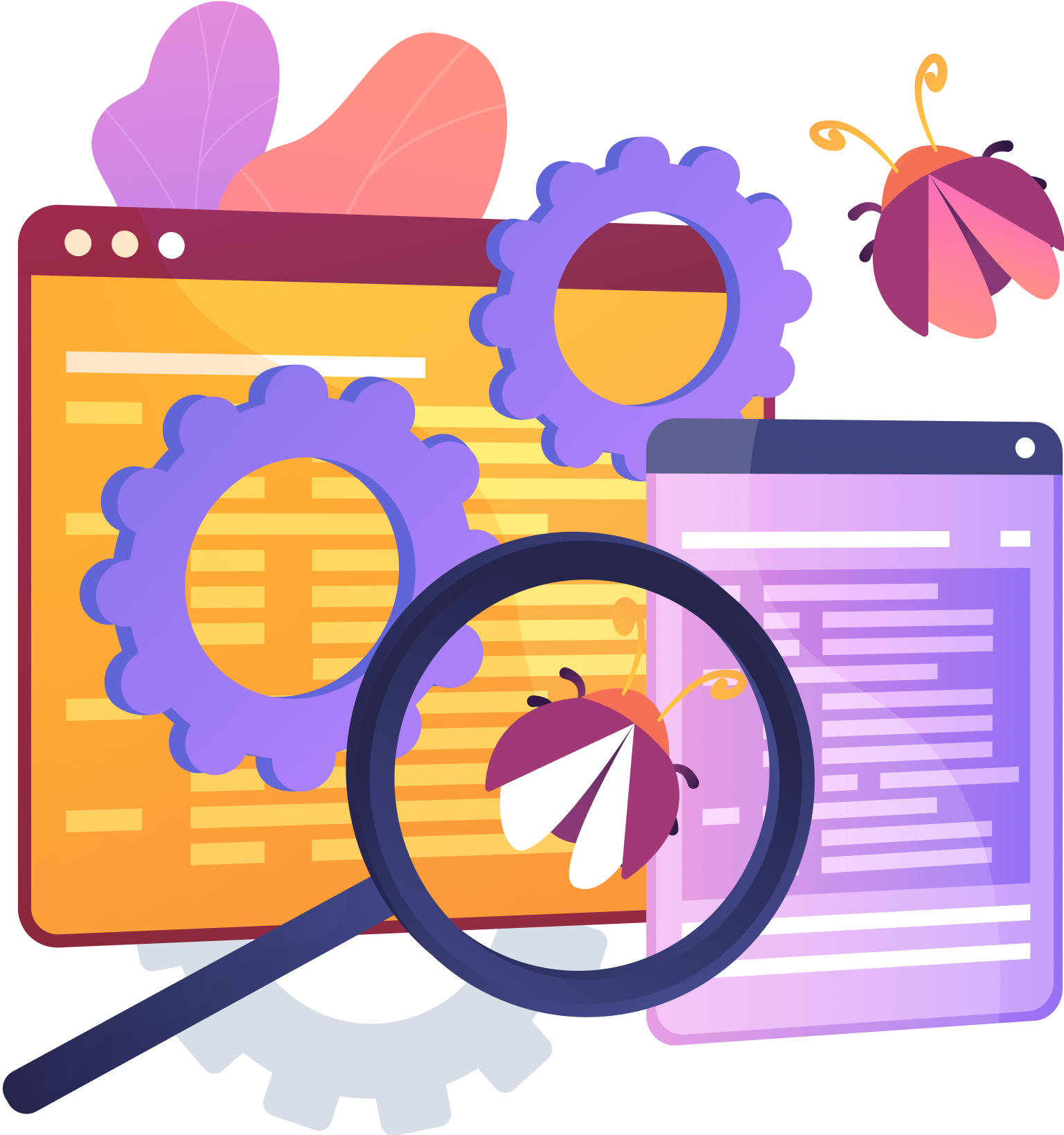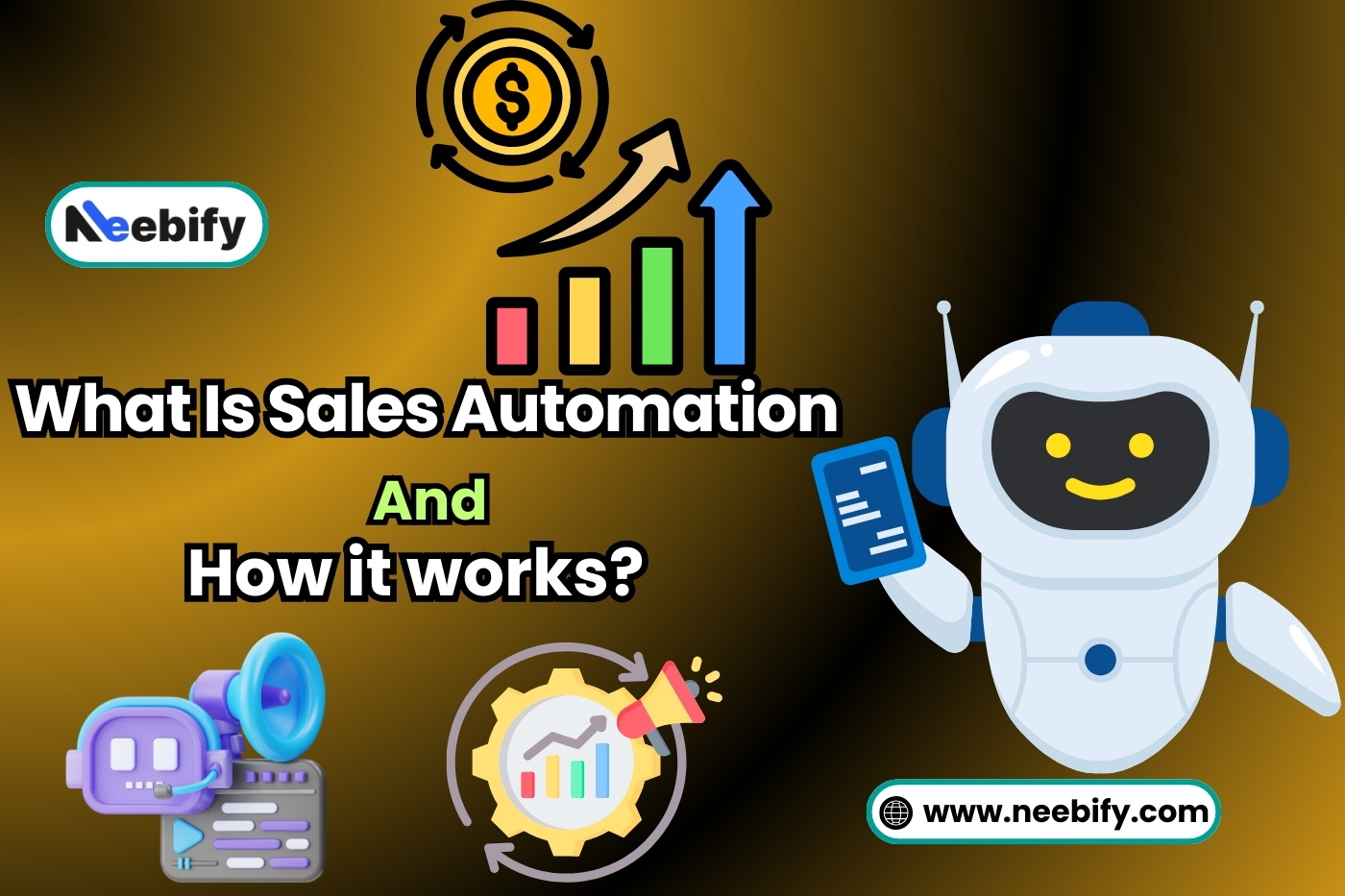How app development is beneficial for business growth?

Mobile applications have become a necessary component of our life in the current digital era. App development has become a vital tool for people and companies, altering everything from everyday routines to commercial operations. This post will discuss app development, its advantages, the process of creating an app, and how it affects the expansion of businesses. Along the way, we'll cover important topics including research and target marketing, choosing features for apps, hiring the best development business, the development process, web development expenses, and the need of maintenance.
What is App Development?
The process of planning, building, and managing mobile applications for different platforms, such iOS and Android, is known as app development. These applications may be used for business, pleasure, or personal use. There are several steps in the development process: idealization, design, coding, testing, and deployment. Programming languages like Java, Swift, and JavaScript are used by app developers to create these digital solutions.
Application Development Categories
Utility Apps
These apps improve user comfort and productivity by providing useful features like calendars, calculators, and note-taking tools. By providing necessary features, they make daily chores easier to do and promote effective organization, which enhances the user experience and makes it more productive.
Entertainment Apps
These include a variety of recreational pursuits, such as gaming application and music, movie, and video streaming services. With the goal of giving consumers engaging and immersive experiences, these applications entertain on the go and accommodate a wide range of hobbies and preferences.
Social Networking Applications
Through messaging, social media platforms, and professional networking tools, social networking apps facilitate community creation and communication among users. These apps improve social interactions and encourage networking opportunities for both individuals and enterprises by fostering connections and partnerships.
E-commerce Apps
By streamlining online transactions and enabling consumers to browse, buy, and track products easily, e-commerce apps transform the way people shop. These applications give consumers access to a variety of goods and services and improve the shopping experience by offering features like seamless delivery tracking, tailored suggestions, and secure payment processing.
Apps for Health and Fitness
Health and fitness applications provide tools for recording physical activity, keeping an eye on health indicators, and accessing exercise plans or dietary advice with the goal of enhancing lifestyle choices and increasing overall wellness. These applications provide users with the tools to take charge of their health journey by offering individualized insights and inspiration to reach their fitness objectives.
Education and Learning Applications
With a variety of educational content available, such as educational games, online classes, and applications for learning languages, education and learning apps are excellent tools for gaining knowledge and skills. These applications encourage lifelong learning and skill development for users of all ages and backgrounds by offering easily accessible and captivating learning experiences.
Apps for Travel and Navigation
With tools for organizing excursions, making hotel reservations, figuring out routes, and discovering new places, travel and navigation applications streamline the process of organizing vacations. Through personalized recommendations and up-to-date information, these applications improve travel experiences and enable users to make knowledgeable decisions when discovering new locations.
Finance and Banking Applications
With capabilities for mobile banking, budgeting tools, investment tracking, and safe payment services, finance and banking applications transform financial management. By giving users access to necessary financial services and facilitating easy transactions while on the go, these apps enable users to manage their finances securely.
Productivity Apps
Productivity applications, which include tools for task management, time tracking, project collaboration, and document editing, are designed to improve productivity and organization. Through the optimization of workflows and the promotion of team cooperation, these applications enable users to attain their objectives and increase productivity.
Apps for Personalization and Lifestyle
Apps for personalization and lifestyle include features for personal organization, customization, and activities linked to hobbies. They are designed to meet the needs and preferences of the user. These applications enable users to express themselves and improve their lives in significant and unique ways, from personalized workout regimens to personalized home décor ideas.
Platforms for Various App
Platforms and types of applications differ, and each is designed to satisfy particular user requirements and preferences. Native applications use platform-specific languages to create programs that are customized for particular platforms, such as iOS or Android, and provide full access to device functionalities. On the other hand, web apps ensure cross-platform compatibility but offer restricted access to device functionalities because they are accessed through web browsers and operate on web servers. Hybrid applications combine web and native components, offering flexibility and a single codebase for cross-platform deployment. Progressive Web Apps (PWAs) are installable on devices and provide native app-like experiences.
They are accessible through web browsers and have capabilities like push notifications and offline access. Code reuse between platforms is made possible by cross-platform apps, which are created with frameworks like React Native or Flutter, expediting the development process. Companies base their choice of app type and platform on objectives related to development, target audience, and budget. Businesses may make well-informed decisions and select the best platform to efficiently reach their audience and provide a seamless and engaging user experience by knowing the differences between different app kinds.
IOS VS. Android
Development Requirements
Swift or Objective-C are the programming languages used to create iOS apps, and the Xcode IDE is only compatible with macOS. Android Studio or other IDEs can be used to build Android apps on Windows, macOS, Linux, and other platforms. Android apps are produced in Java or Kotlin.
User Interface rules
Apps on iOS and Android differ in how they look and interact because of the differing design rules for each platform (Material Design for Android, Human Interface Guidelines for iOS).
Market Share
Android is a preferred platform for reaching a wider audience because it has a higher worldwide market share than iOS. But compared to Android users, iOS consumers typically spend more money on applications and in-app purchases.
Device Fragmentation
Because Android runs on a variety of devices made by various manufacturers, there is a vast variation in screen sizes, resolutions, and hardware specifications among the devices. iOS, on the other hand, offers a more regulated ecosystem and a smaller range of devices, which makes it simpler for developers to guarantee app compatibility.
App Store Ecosystem
Android apps can be downloaded directly from websites, through third-party app stores like Google Play Store, or they can be distributed exclusively through the Apple App Store for iOS apps.
Development Tools and Resources
Official documentation, SDKs, APIs, developer communities, and other resources are all readily available on both platforms. The ecosystems for iOS and Android may differ in terms of third-party libraries and frameworks' accessibility, however.
Monetization Strategies
App developers can use a variety of monetization techniques on both iOS and Android, such as paid apps, in-app purchases, subscriptions, advertising, and freemium business models. However, depending on the tastes and demographics of users on each platform, the efficacy of each technique may vary.
What is The Procedure That Developers Use To Develop Apps?
The process of developing an app is a long one that calls for careful planning, creative design, accurate coding, thorough testing, smooth launch, and continuous maintenance. The process starts with careful planning and research, during which developers collect requirements and specify the goals and intended user base of the app. The user interface and layout of the app are then conceptualized by designers, who produce wire frames and prototypes to show the user experience. After the design is complete, programmers use several programming languages and frameworks to build the functionality of the app.
Before deployment, quality assurance engineers carry out thorough testing to find and fix any flaws or problems. Ultimately, the application is released into app stores or distribution networks, enabling consumers to access it. Developers maintain and update the software after it is deployed to make sure it stays safe, operative, and aligned with evolving user needs and technological advancements. To create a successful and influential app, teamwork, communication, and constant improvement are essential throughout this process.
What Applications Can Provide for Companies
Apps offer businesses a plethora of opportunities to enhance operations, engage customers, and drive growth. They provide a direct channel for communication and interaction with customers, facilitating personalized experiences, targeted promotions, and loyalty programs. Additionally, apps streamline processes and improve efficiency through features like appointment scheduling, inventory management, and order tracking, thereby reducing operational costs and increasing productivity. Furthermore, apps enable businesses to gather valuable data on customer behaviour, preferences, and trends, empowering data-driven decision-making and personalized marketing strategies.
From enhancing customer service and brand visibility to expanding reach and generating new revenue streams, apps serve as powerful tools for businesses to stay competitive in today's digital landscape. By leveraging the potential of apps, businesses can strengthen customer relationships, foster brand loyalty, and unlock new opportunities for innovation and growth.
Crucial Advice for Creating Apps
Recognize User Needs
In order to fully comprehend the complex requirements, inclinations, and problems of your intended audience, extensive study is necessary. You may create an app with user-centric features and functions that successfully meet the demands of your users by learning about their expectations and behaviour patterns. By keeping the user at the centre, you can make sure that your app connects with users, which will boost happiness and engagement.
Emphasize Simplicity
Creating a smooth and joyful user experience requires simplicity. You can improve usability and reduce user irritation by maintaining a straightforward and intuitive app design and user interface. By keeping your software simple to use and free of superfluous complexity, you may increase retention rates and get great feedback from users.
Prioritize Performance
Improving the efficiency of your app is essential to guaranteeing a satisfying user experience. Retaining users and avoiding desertion requires quick loading times, seamless navigation, and responsiveness across many platforms and devices. Making performance optimization a top priority while developing an app contributes to a smooth and captivating user experience that attracts new users.
Test Carefully
Prior to releasing your software, thorough testing is essential to find and address bugs, problems, and usability concerns. Compatibility and dependability across diverse user contexts are ensured through testing conducted on a range of devices, operating systems, and network situations. Thorough testing at every stage of the development process contributes to the creation of a high-calibre app that lives up to user expectations and keeps up a good reputation.
Iterate and Improve
Adopting an iterative approach to app development enables you to integrate analytics and user input to enhance and polish your app continuously. Maintaining your app's relevance and competitiveness in the market requires regular upgrades and improvements based on user insights. You may adjust to shifting customer requirements and preferences by iterating and enhancing your app over time, which will guarantee long-term success and user pleasure.
Put Security First
To gain the trust and confidence of your users, you must put the security and privacy of user data first. Protecting user information from potential threats and breaches can be achieved by putting strong security measures in place, such as encryption, secure authentication, and data protection policies. Creating a safe environment for apps encourages user trust and loyalty, which improves the user experience overall and helps the app succeed in the long run.
Make a Scalability Plan
To handle growing user demand and feature expansion, it's critical to plan for future growth and scalability. Scalability in app architecture and infrastructure design guarantees that your app can grow with increasing traffic and features without sacrificing performance. By considering scalability from the beginning of the development process, you can future-proof your software and make it capable of growing and changing with your user base and business requirements.
Market Strategically
Creating a thorough marketing plan is necessary to advertise your app and successfully connect with your target market. App downloads and visibility can be increased by utilizing a variety of methods, including influencer relationships, social media marketing, app store optimization (ASO), and targeted advertising. You may optimize user acquisition and retention and eventually contribute to the success and expansion of your app by carefully targeting the proper audience with your app promotion.
Investigation and Focused Marketing
Efficient creation of apps commences with comprehensive market analysis. It entails determining the characteristics, interests, and habits of your target market. By getting to know your target, you may customize your app to fit their unique requirements and improve its chances of success.
Selecting Features for an App
Choosing features for an app is an important part of the development process that requires careful analysis of market trends, corporate goals, and user wants. Developers map out a successful app's functionality by determining what features are most important and giving the user experience top priority.
Features vary from more sophisticated features like in-app purchases and social network integration to more fundamental ones like user authentication and navigation. App features are carefully chosen to give value, increase engagement, and set the app apart from competitors through extensive research, user input, and iterative design, guaranteeing a captivating and user-centric final product.
How to Choose the Best App Development Firm
Working with a trustworthy app development company is crucial to the success of your app. Seek out a business that has a solid track record, seasoned developers, and a robust portfolio. To make an informed choice, look for references and go over customer testimonials.
How To Evaluate The Costs of App Development
The intricacy, platform, and feature set all affect how much an app develops. More complex apps can cost several hundred thousand dollars, while simpler ones can cost only a few thousand. It is crucial to set aside money for both development and post-launch marketing. Design, development, testing, and deployment costs should all be taken into account when creating a budget to ensure a thorough approach.
Making prudent app development investments supports corporate objectives. It produces a product that stands out in the crowded digital market and connects with users. Effective financial planning at every stage of the development process is essential to the app's long-term success.
READ ALSO- What is application development? And ADLC?
Care and Assistance
Maintaining an updated and functional app requires regular maintenance. It includes frequent bug corrections, feature additions, and updates. You can maintain the security and optimization of your app with continuous help from a reputable app development firm.
The dynamic process of developing apps can greatly aid in the expansion of businesses. Numerous advantages are provided by it, such as improved visibility, engaged customers, and efficient operations. Working with a trustworthy development business, doing extensive research, and choosing features carefully are all necessary for app development success. Long-term viability of the app also depends on regular upgrades and maintenance. Accept the digital age and realize how app development can help you grow your company to new heights.
How Can Technanosoft Elevate Your App Development?
Technanosoft provides customized solutions that are made to fit your specific business goals, which improves your mobile app development journey. Our skilled team creates scalable, user-friendly mobile applications by utilizing industry best practices and cutting-edge technologies. We place a high value on user-centric design, guaranteeing smooth user experiences and user-friendly interfaces that promote engagement and expansion.
We work directly with you to adapt to changing requirements and provide solutions that exceed expectations, with an emphasis on agile development approaches. Please put your trust in Technanosoft to accelerate the development of your mobile app and provide your company with the tools it needs to prosper in the digital age.
FAQs:
Q.1- What is the Application Development Life Cycle (ADLC)?
A- The Application Development Life Cycle (ADLC) includes multiple phases that are essential for the smooth development of software. The project journey starts with planning, where goals and specifications are established. It continues through design, development, testing, deployment, and maintenance. To guarantee the best possible program functionality and user experiences, each step is carefully carried out. Developers may produce high-quality apps that successfully satisfy customer expectations by streamlining the app development process by adhering to this systematic strategy.
Q.2- How Can I Choose the Right Development Methodology for My App?
A- The success of a project depends on the choice of development approach. Popular choices include Waterfall, Agile, and Rapid Application Development (RAD), each appropriate for a particular project's needs. Due to its emphasis on flexibility and teamwork, agile is perfect for complicated projects whose requirements change over time. Waterfall is a sequential method that works best for projects that are clearly defined and don't require many adjustments. Rapid prototype and iteration are prioritized by RAD, which is advantageous for projects with short deadlines. Developers enable effective and efficient application development by customizing the process to the requirements of each project.
Q.3- Which Major Trends Will Affect App Development in the Future?
A- Emerging developments will have a big impact on the app development industry in the future. Innovation is mostly being driven by the integration of edge computing, PWAs, and artificial intelligence (AI). User experiences are improved with AI integration, which increases app intelligence and customization. PWAs bridge the gap between online and mobile apps by providing improved web experiences. App performance is improved by edge computing's speedier data processing capabilities. Developers can guarantee that their applications remain competitive in the ever-changing digital ecosystem by keeping up with current developments.
Q.4- What Are the Benefits of Cross-Platform Development for My App?
A- Cross-platform development has many benefits, including the ability to distribute software to a larger user base across many operating systems and devices. Developers can save time and resources by writing code only once and deploying it across various platforms by using frameworks like Xamarin or React Native. Cross-platform apps also offer wider market reach, easier maintenance, and consistent user experiences. This strategy takes into account a wide range of user preferences and device specs while optimizing efficiency and guaranteeing app accessibility.
Q.5- Which Security Steps Should I Take While Developing Apps?
A- To protect user data and uphold confidence in the digital world, strong security features must be incorporated from the outset of app development. Safe authentication methods, encryption strategies, and regulatory compliance frameworks like HIPAA and GDPR guarantee data security. Frequent security audits and updates help to minimize vulnerabilities, which lowers the chance of illegal access and data breaches. Developers maintain user privacy and confidence by placing a high priority on app security throughout the development lifecycle, which helps them build enduring relationships with their audience.
Q.6- Why Should I Choose to Have My App Updated and Maintained Often?
A- To keep an app functioning, secure, and relevant, regular updates and maintenance are necessary. Through bug fixes, feature implementations, and performance optimization, developers make apps longer-lasting and improve user experiences. Due to the increased vulnerability of obsolete software, proactive maintenance also reduces security threats. Furthermore, regular updates show a dedication to improving the product and satisfying users, which encourages recurring business and favourable evaluations. Developers maintain app quality, competitiveness, and user pleasure in the constantly changing digital landscape by placing a high priority on continuous maintenance.
Q.7- How Can I Effectively Monetize My Mobile App?
A- Effective mobile app monetization necessitates the implementation of many revenue streams that are adapted to user preferences and industry trends. Advertising, sponsorships, in-app purchases, and subscriptions are all well-liked tactics that target certain user demographics. Developers can enhance income potential by optimizing monetization strategies based on user behaviour and demographic analysis. Furthermore, data-driven decision-making is made possible by integrating analytics tools, which improves user engagement and monetization tactics. For long-term success in the cutthroat app industry, maintaining profitability and user retention requires striking a balance between monetization and user experience.
Q.8- What User-Centric App Design Best Practices Are?
A- The core principles of user-centric app design are to prioritize the requirements and preferences of the user by designing intuitive interfaces and seamless experiences. Developers can make more informed design decisions by doing user research, which provides insights into user behaviours, pain areas, and preferences. Accessibility features guarantee inclusion by accommodating a range of user skill levels. Through the use of iterative design techniques like usability testing and prototyping, user experiences are improved overall by incorporating feedback and being refined on a user-by-user basis. Developers that adopt user-centric design concepts produce apps that connect with users, building brand loyalty and propelling success in the cutthroat app industry.









